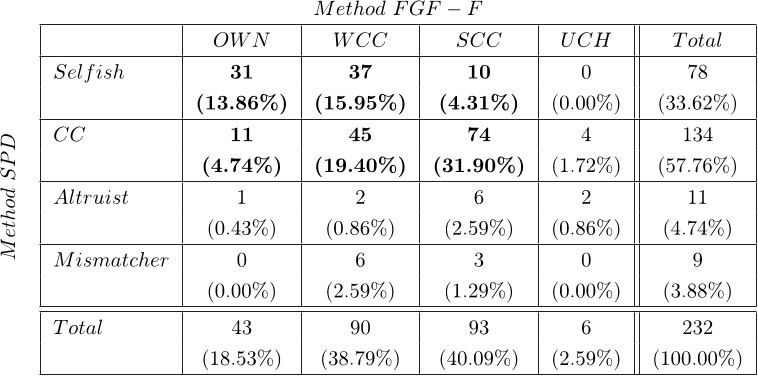Q2. What is the resulting payoff of player i with initial endowment yi?
The resulting payoff of player i with initial endowment yi = 20 POINTS is given by:πi = yi − gi + α 4∑j=1gjwhere gi ∈ [0, 20] denotes individual contributions and α = 0.4 is the marginal per capita return (MPCR) of the public good.
Q3. How many participants took part in the experiment?
In total, 232 participants took part in the experiment earning $2.85 on average with an average completion time of approximately 13 minutes.
Q4. How many subjects are classified as selfish?
individuals classified as ‘selfish’ in SPD, are classified as ‘selfish’ according to FGF-T only in around 34.6% of the cases.
Q5. What type of behavior is similar to the altruist in SPD?
Compared to subjects classified as ‘selfish’ in SPD, contributions of ‘conditional cooperators’ (CC) have a decisively steeper slope in the contributions of others, i.e., they match others’ contributions to a larger degree.
Q6. What is the correlation coefficient of Thöni and Volk?
The refinement of Thöni and Volk (2018) of FGF (FGF-T hereafter) resembles a theory-driven approach and is based on the Pearson correlation coefficient.
Q7. What does the CC type mean in SPD?
This indicates that SPD performs well in identifying subjects who have a consistent pattern of conditional cooperation across games, while this does not hold for selfish types.
Q8. What is the probability of a subject being classified as CC in SPD?
Given that a subject is of CC type in SPD, the probability is 93.3% to be classified as CC as well according to FGF-T (refinement of Thöni and Volk, 2018) and 88.8% according to FGF-F (refinement of Fallucchi, Luccasen, and Turocy, 2018), respectively.
Q9. What is the relative frequency of a CC type in SPD?
If the authors look at the conditional relative frequencies,we see that conditional on being classified as CC type in SPD, the relative frequency is 88.8% to be classified as either WCC or SCC according to FGF-F.
Q10. How many cases are a subject classified as selfish in SPD?
By contrast, a subject classified as selfish in SPD is only selfish in 39.7% of the cases according to FGF-F.Starting from FGF-F, a subject sorted in the group of selfish types according to FGF-F, is also selfish in SPD in 72.1% of the cases.









